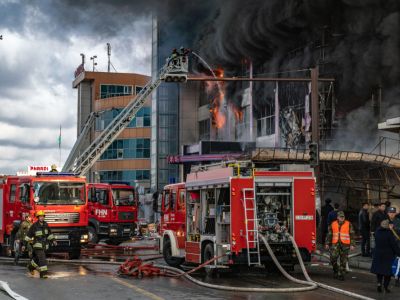Egyptian President Hosni Mubarak opposes any anti-terrorist coalition to confront the attacks on the United States that is not under the auspices of the United Nations, an official newspaper said Saturday.
"A coalition grouping a select number of countries must not be formed since that will not permit decisive and collective international action against terrorism," Mubarak told the government-run al-Ahram daily.
"It would be better to hold an international conference against terrorism under the auspices of the United Nations to adopt binding resolutions for all the countries of the world," he said.
US Secretary of State Colin Powell is building a global anti-terrorism coalition to back US retaliation for this week's strikes in New York and Washington, and is especially looking to the Arab world for support.
Mubarak called Friday for a UN conference on terrorism, and several years ago urged a similar summit after his country was hit by a wave of attacks by Islamic fundamentalists during the 1990s.
The leader himself escaped an assassination attempt in Ethiopia in June 1995 carried out the Egyptian Islamic fundamentalist group, Jamaa Islamiya.
The group's leader, Rifai Ahmed Taha, is a close collaborator of Osama bin Laden, a key suspect in the suicide attacks on New York and Washington.
Foreign Minister Ahmed Maher, also quoted by al-Ahram, said Egypt would "not be part of any coalition and that the fight against terrorism must be done as part of an international conference of the UN or Security Council."
Asked whether Egypt could in any way assist US retaliation against the terrorist attacks on Tuesday, Maher said the question "has not been broached."
Egypt, which is a strategic ally of Washington, is the second largest beneficiary of US aide in the Middle East after Israel, with $1.3 billion of annual military aid.
Meanwhile, the country's newspapers expressed sympathy for Americans after the terrorist attacks, but criticized the country's policies and leaders.
"We do not rejoice in the suffering of a people who are friends," said the government daily Al-Akhbar, which also published an editorial on the "errors" of successive US administrations.
"It is not a secret that the United States elicits hate and resentment of numerous governments and people in the world because of its political decisions taken in a unilateral way," said the paper's editor-in-chief Ibrahim Saada.
"These decisions only serve American interests abroad, and those also of Israel," he said.
The Al-Ahram editor called on the United States to "show lots of wisdom" to redeem a reputation tarnished in the eyes of Arabs, but also said it "sympathized with the sorrow and anger" of the nation.
"US credibility is especially in doubt in the Middle East over the bloody clashes between the Palestinians and Israelis," said Ibrahim Nafie.
Others commented on the initial approval of some Egyptians of the horrific September 11 attacks on the United States, and the celebrations that erupted in the Palestinian territories and their refugee camps in Lebanon.
"The celebrations in the certain Arab cities were the best gift that we could have offered the American media, which have mobilized to disfigure the image of Arabs and Muslims," said Daoud al-Sherian, an editorialist with the Arab-language Al-Hayat daily -- CAIRO (AFP)
© 2001 Al Bawaba (www.albawaba.com)









